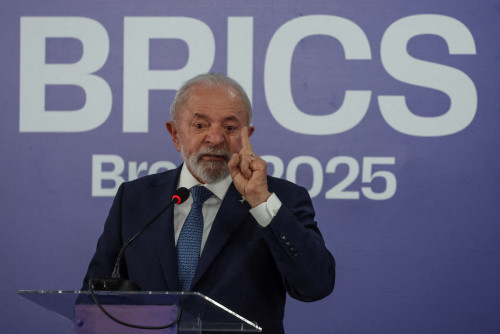By Nandita Bose, Bernardo Caram and Gabriel Araujo
WASHINGTON/BRASILIA/SAO PAULO (Reuters) -Brazil’s government on Friday downplayed the impact of the 50% tariff U.S. President Donald Trump threatened to impose on imports from that country, as leaders from both nations expressed a cautious willingness to negotiate in the future.
Trump told reporters he might speak later to Brazil’s President Luiz Inacio Lula da Silva, who earlier said he would seek a diplomatic solution but reciprocate like-for-like if the tariffs take effect on August 1 as promised.
“Maybe at some point I’ll talk to him. Right now I’m not,” Trump said as he left the White House to visit flood-ravaged Texas, again criticizing Brazil’s legal proceedings against former right-wing President Jair Bolsonaro.
Trump’s remarks came as Lula told Record TV in an interview aired late on Thursday that “we’ll first try to negotiate, but if there’s no negotiation, the law of reciprocity will be put into practice.”
Brazil’s government projected the tariffs to have little impact on its economic growth this year, which it expects to reach 2.5%, as only some specific manufacturing sectors would be hard hit.
But a White House official, who requested not to be named, told Reuters on Thursday that, because the new tariffs, including Brazil’s, are an extension of the levies announced in April, energy products like oil and critical minerals would continue to be exempt.
Oil is Brazil’s top export to the United States, and, on Thursday, the Brazilian oil lobby group IBP remained uncertain if the exemption that benefited the commodity would continue. The U.S. embassy in Brazil didn’t immediately reply to a request for comment.
The U.S. is also a large importer of Brazilian steel products, pulp, coffee, orange juice and beef – goods that the government said could find other global buyers.
“Given this scenario, the impact of the tariffs tends to be of little significance on 2025 growth, although some manufacturing sectors may be particularly affected,” Brazil’s Finance Ministry said in a report.
Those include the aerospace industry, with the U.S. accounting for a large chunk of planemaker Embraer’s revenues, and energy-related machinery.
NEW BUYERS
Lula had already vowed to find new buyers for Brazil’s products, saying that “it is not like we cannot survive without the U.S.”
Economic Policy Secretary Guilherme Mello told reporters that even if “some” effects are felt on growth, they would not be as relevant as before, saying that Brazil managed to diversify its trade partners over the past two decades.
Roughly 12% of Brazil’s exports go to the U.S., while top trading partner China accounts for around 28%. The Asian superpower on Friday also slammed Trump’s tariffs on Latin America’s largest economy.
“Tariffs should not be used as a tool for coercion, bullying, or interference in other countries,” Chinese Foreign Ministry spokesperson Mao Ning told a press conference in Beijing.
But exporters were concerned about the impact of Trump’s new tariffs. The head of Brazil’s beef industry group ABIEC said the levies would make it “economically unfeasible” for the South American country to export beef to the U.S.
Still, in a letter to Lula on Wednesday, Trump left few options for Brazil to respond when he linked the tariffs to the country’s judiciary launching legal proceedings against Bolsonaro, who is on trial on charges of plotting a coup to stop Lula from taking office in 2023.
Trump on Friday repeated his defense of Bolsonaro. “They’re treating President Bolsonaro very unfairly,” he said.
In an interview with TV Globo, Lula said he found Trump’s reasoning for the tariffs “extremely outrageous.”
Lula said he could not accept that Trump was calling for an end to proceedings against a man who “didn’t just try to stage a coup. He tried to prepare my death.”
Bolsonaro denies any wrongdoing.
Brazilian assets remained under pressure on Friday, with the real currency down 0.7% versus the dollar, and the local stock index off by 0.5%. The real’s weekly decline was on track to be the largest since at least late February.
(Reporting by Nandita Bose and Doina Chiachu in Washington, Bernardo Caram in Brasilia, Gabriel Araujo in Sao Paulo; Additional reporting by Shi Bu in Beijing, Jarrett Renshaw in Washington, and Rodrigo Campos in New York; Editing by Manuela Andreoni, Nick Zieminski, Rod Nickel)





